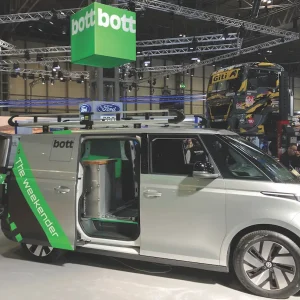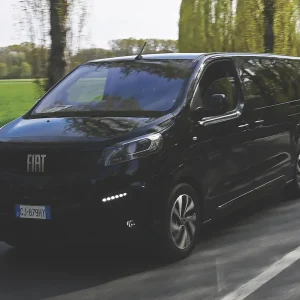Iveco reported a positive performance in the UK light commercial market in 2021, with the number of Iveco Daily registrations rebounding from the previous year.
They totalled 4,621, compared with 2,406 in what was a very harsh 2020 for all manufacturers, owing to the Covid-19 pandemic.
That equated to a 92.1% boost, way ahead of an overall marketplace improvement of 21.4%, according to figures compiled by the Society of Motor Manufacturers and Traders.
So how come the Iveco Daily did so well? “Because at 3.5t it’s well suited to capitalise on the economy’s strongest growth areas: dotcom, construction and the utilities,” says Iveco’s UK light business line director, Mike Cutts.
All of these sectors have one thing in common. Because of the nature of their work they tend to favour chassis-mounted bodies (refrigerated boxes, tippers and similar vehicles) rather than factory-built vans; and the Iveco Daily is well known for its robust chassis.
“Some 70% of the 3.5t vehicles we sold last year were bodied chassis cabs rather than simple white vans,” explained Cutts, addressing the media at Iveco’s 2022 State of the Nation press conference in February.
Iveco’s decision to target the dotcom sector (which Cutts said it re-entered in 2021) paid off substantially, with Tesco acquiring 645 Iveco Daily 3.5t vehicles to support its home delivery operations. “Other manufacturers struggled to supply,” he observed.
Iveco also decided to target rental fleets – a step that always has to be taken carefully. Supplying them can generate potentially massive registrations, but they are notorious
for driving the hardest of hard bargains.
The decision was not taken to bump up Iveco’s sales figures, however, but somewhat paradoxically, to improve Iveco Daily residual values.
As indicated earlier, Dailys are solidly built. As a consequence, operators tend to hang on to them for longer than they would retain weakly-built models produced by other brands.
The net result is that when Dailys are disposed of, they have usually been used for a number of years, and seen a lot of hard work, and their second-hand price suffers accordingly. The amount they fetch is reflected in the mediocre residual values quoted in the commercial vehicle used price bibles, and that can impact on contract hire rates.
“Rental vehicles have an average first life of 24 to 36 months and occasionally 42 months, regardless of what they are,” said Cutts. “So when they come to market their residual values have a positive impact on the guide prices because they’re younger; just so long as you don’t oversupply the sector, of course.”
Not that Iveco, or any other mainstream manufacturer for that matter, is in a position to oversupply any sector, with delivery times still stretching months into the future.
Iveco’s rental strategy seems to have paid off. “Our residuals are now bang in line with the rest of the industry according to the CAP and Glass’s price guides,” Cutts claimed.
Building on its strength in the chassis cab sector, Iveco has put plenty of impetus behind its Daily Driveaway initiative, making 10 different models available. The line-up includes everything from dropsides and tippers, to Lutons and curtainsiders.
It has also come up with Business Trimline, a specification package that delivers extra benefits for the driver. “It includes air conditioning, cruise control, heated adjustable exterior mirrors and front fog lights,” Cutts explained.
Having such items fitted is sure to boost a Daily’s second-hand value as well as helping to keep the driver happy at a time when labour is in short supply. “Some 70% of customers now opt for Daily Business trimline,” he said.
Iveco is continuing its policy of blitzing carefully-identified areas of industry and commerce. Grounds maintenance and forestry customers are among those in its sights this year.
It will be approaching them with a new model now starting to appear in the UK after its launch six months ago.
In its latest incarnation the Iveco Daily comes with a new six-speed gearbox, new engine technology that includes a redesigned 2.3L diesel engine, memory foam seats, the optional air pro-pneumatic suspension system, and Driverpal. “Through Amazon Alexa voice commands, it enables the driver to interact with both the vehicle and the wider driver community,” said Cutts.
An electric Iveco Daily will also be launched in the coming months.
Despite the grim international climate, Cutts is optimistic about Iveco’s prospects this year, and points to continued growth in the dotcom sector.
“Home deliveries of groceries doubled during the pandemic, parcel deliveries boomed too, and that shift will remain,” he predicted.
“Sure, it’s likely to balance out slightly as things return to normal and people get back to the high street,” he added. “However, we’ve become used to that way of shopping.
“We’ve experienced its convenience; and we’re unlikely to move away from it.”





